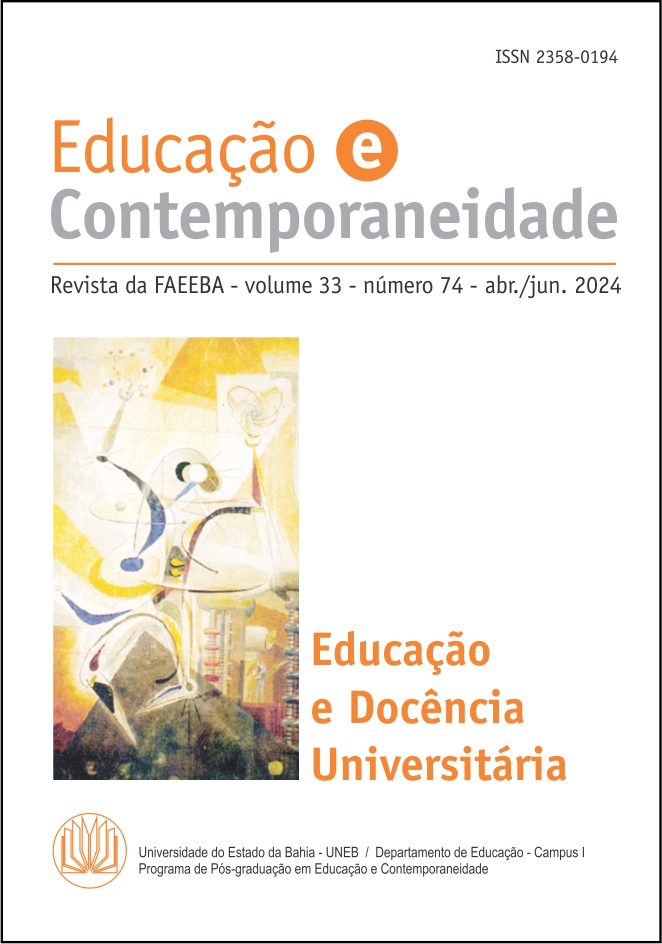Learning to teach in the popular pre-university courses: what graduates say
o que dizem os egressos
DOI:
https://doi.org/10.21879/faeeba2358-0194.2024.v33.n74.p186-202Keywords:
popular pre-university courses, knowledge base, science teaching, graduatesAbstract
From the interest in understanding the aspects of learning to teach in the context of the Licentiateship courses in Natural Sciences, we verified the potential of investigating the popular pre-university courses (CPUPs, Portuguese initials) in the knowledge construction needed for the teaching practice. Based on the knowledge base proposed by Shulman, this research aimed to understand the importance of working in CPUPs for learning to teach from the analysis of the say of licentiates who worked as teachers in the CPUPs. This qualitative research has as it subjects, graduates from Licentiateship courses on Chemistry, Physics and Biology from some universities of São Paulo state. who were contacted and agreed to answer an online questionnaire. The results point especially to difficulties related to general pedagogical knowledge of teaching.
Downloads
References
BARDIN, L. Análise de conteúdo. São Paulo: Edição 70, 2016.
BRAGA, A. W. V.; ABREU, L. D. P.; SOUZA, L. A.; IBIAPINA, M. L.; SILVA, R. M. G. Extensão Universitária e educação: contribuição do projeto PREVEST/UVA à formação acadêmica. Sanare, v. 14, n. 1, pp. 93-103. 2015. Disponível em: <https://sanare.emnuvens.com.br/sanare/article/view/616>. Acesso em 09 mar. 2023
BRASIL. Ministério da Educação. Programa de Extensão Universitária – PROEXT. 2003. Disponível em: <http://portal.mec.gov.br/index.php?option=com_content&view=article&id=12241&Itemid=487>. Acesso em: 10 mar. 2023.
CALDERHEAD, J. Dilemmas in developing reflective teaching. Teacher Education Quarterly, v. 20, n.1 p. 93-100. 1993. Disponível em: < https://www.jstor.org/stable/23475154>. Acesso em 07 mar. 2023.
CARDOSO, P. C.; FELICETTI, V. L. Práticas docentes sobre o olhar de egressos. REMIE - Multidisciplinary Journal of Educational Research, v. 6, n. 2, pp. 104-126. 2016. Disponível em: <https://dialnet.unirioja.es/servlet/articulo?codigo=5559879>. Acesso em 12 mar. 2023.
CAVALCANTE, M. M. S.; FARIAS, I. M. S. A formação e a identificação com a profissão de egressos de programa de inserção na docência. Educação em Perspectiva, v. 6, n. 1, pp. 97-122. 2016. DOI: 10.22294/eduper/ppge/ufv.v7i1.730. Disponível em: <https://periodicos.ufv.br/educacaoemperspectiva/article/view/6864>. Acesso em 13 mar. 2023.
CHAER, G.; DINIZ, R. R. P.; RIBEIRO, E. A. A técnica do questionário na pesquisa educacional. Evidência, Araxá, v. 7, n. 7, p. 251-266. 2011. Disponível em: <http://www.educadores.diaadia.pr.gov.br/arquivos/File/maio2013/sociologia_artigos/pesqusia_social.pdf>. Acesso em 15 mar. 2023.
FACHIN, O. Fundamentos de metodologia. 5ª ed. São Paulo: Saraiva, 2006
GARCÍA, C. M. Formação de professores para uma mudança educativa. Porto: Porto Editora. 1999.
GIL, A. C. Como elaborar projetos de pesquisa. 5ª ed. São Paulo: Atlas, 2010.
LÜDKE, M.; ANDRÉ, M. E. D. A. Pesquisa em educação: abordagens qualitativas. São Paulo: E.P.U, 2012. pp 112.
MANCHUR, J.; SURIANI, A. A.; CUNHA, M. C. A contribuição de projetos de extensão na formação profissional de graduandos de licenciaturas. Revista Conexão UEPG, v. 9, n. 2, p. 334-341. 2013. Disponível em: <https://revistas.uepg.br/index.php/conexao/article/view/5522>. Acesso em 09 mar. 2023.
MIZUKAMI, M. G. N. Aprendizagem da docência: algumas contribuições de L. S. Schulman. Revista do Centro de Educação, v. 29, n. 2, p. 33-49. 2004. Disponível em: <https://periodicos.ufsm.br/reveducacao/article/view/3838>. Acesso em 10 mar. 2023.
_______________; REALI, A. M. M. R. O professor a ser formado pela UFSCar: uma proposta para a construção de seu perfil profissional. In: PIERSON, A. H. C. & OLIVEIRA E SOUZA, M. H. A (orgs.); Formação de professores na UFSCar: implantação e gestão de projetos pedagógicos das licenciaturas. 1ª ed. São Carlos: EdUFSCar. 2010. pp. 17-36.
MORAES, A. C.; OLIVEIRA, R. M. M. A. Cursos Pré-Vestibulares Populares e aprendizagem da docência: alguns encontros. Práxis Educativa (Brasil), v. 1, n. 2, p. 125-144. 2006. Disponível em: <http://www.redalyc.org/articulo.oa?id=89410212>. Acesso em 03 mar. 2023.
RODRIGUES, R. A extensão universitária como uma práxis. Em extensão, Uberlândia, v. 5, pp. 84-88. 2006. Disponível em: <https://seer.ufu.br/index.php/revextensao/article/view/20340>. Acesso em 03 mar. 2023.
SAMPAIO, J. H. Extensão universitária como um dos sentidos necessários para a articulação da indissociabilidade na construção do currículo. In: PIERSON, A. H. C. & OLIVEIRA E SOUZA, M. H. A (orgs.); Formação de professores na UFSCar: implantação e gestão de projetos pedagógicos das licenciaturas. 1ª ed. São Carlos: EdUFSCar. 2010. p. 107-125.
SEVERINO, A. J. Metodologia do trabalho científico. 23ª ed. São Paulo: Cortez, 2007.
SILVA, L. R. C. et al. Pesquisa documental: alternativa investigativa na formação docente. In: IX Congresso Nacional de Educação e III Encontro Brasileiro de Psicopedagogia. 2009. Curitiba. Anais... Curitiba: Pontifícia Universidade Católica do Paraná. 2009. p.4554-4666. Disponível em: <https://proinclusao.ufc.br/wp-content/uploads/2021/08/pesquisa-documental.pdf>. Acesso em 17 mar. 2023.
SHULMAN, L. S. Those who understand: knowledge growth in teaching. Educational Researcher, v. 15, n. 2, p. 4-14. 1986. DOI: 10.2307/1175860. Disponível em: <https://www.jstor.org/stable/1175860>. Acesso em 01 mar. 2023.
_______________. Knowledge and teaching: foundations of the new reform. In: SHULMAN, L. S. Teaching as Community Property: essays on higher education. San Francisco/CA/USA: Jossey-Bass, 2004. p. 83-113.
VERRANGIA, D. Os cursos pré-vestibulares populares enquanto espaços educativos e de formação docente: algumas reflexões. Cadernos CIMEAC, v. 3, n. 2, pp. 5-23. 2013. DOI: 10.18554/cimeac.v3i2.1451. Disponível em: <https://seer.uftm.edu.br/revistaeletronica/index.php/cimeac/article/view/1451>. Acesso em 12 mar. 2023.
Additional Files
Published
How to Cite
Issue
Section
License
Copyright (c) 2024 Marina Dias Saraiva, Elaine Gomes Matheus Furlan

This work is licensed under a Creative Commons Attribution-NonCommercial 4.0 International License.
O encaminhamento dos textos para a revista implica a autorização para a publicação.
A aceitação para a publicação implica na cessão de direitos de primeira publicação para a revista.
Os direitos autorais permanecem com os autores.
Após a primeira publicação, os autores têm autorização para a divulgação do trabalho por outros meios (ex.: repositório institucional ou capítulo de livro), desde que citada a fonte completa.
Os autores dos textos assumem que são autores de todo o conteúdo fornecido na submissão e que possuem autorização para uso de conteúdo protegido por direitos autorais reproduzido em sua submissão.
Atualizado em 15/07/2017

















































